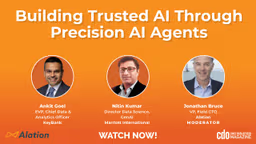Digital Transformation
Enedis, Data Governance Project Manager: Data is often perceived as something mythical and scary
Written by: CDO Magazine Bureau
Updated 1:49 PM UTC, Thu September 21, 2023

(Europe) Fabien Coutant, Data Governance Project Manager, Enedis, speaks with Ricardo Crepaldi, Director Business Intelligence, Big Data and Integration, BASF Germany, about the organization’s approach to data literacy and safety.
Enedis operates the electricity distribution network in France, connecting 36 million customers to the French electric grid. With more and more data connected to the grid, the company has turned into a data operator as well as a network operator.
Enedis currently handles a variety of data, such as the description of the network and electricity consumption in households and businesses, making it available for other stakeholders in the energy market.
“Data is very important and that’s why we are always in the process of opening our data to every stakeholder that needs it. We are in the strategy and governance for data, which means we have to open data but we also have to be very careful about how we open it. We have to have rules and governance,” Coutant says.
Speaking of significant achievements in recent years, he says that a big step was to create an open data platform to make the data accessible.
For example, Enedis publishes the whole of the electricity network in France so it’s available for stakeholders like sports associations, fishing associations, or people working on the street, so that they know where the lines are.
“We saw that statistical data is often not enough for stakeholders who want to take precise actions. And so, we also opened API platforms. It means that with the consent of the customer, the stakeholder can have better access to data and then provide advice so that the consumer can understand the consumption, generation, and take steps to better understand the bill,” Coutant says.
Speaking on data literacy initiatives within Enedis, Coutant says that the company initially had data teams separated from business units, but it was difficult to operate that way. The company took a mindset change approach for the whole company to integrate data units with the business units and technicians.
“We have a lot of pedagogical actions about this, so we have training, interventions, and conferences. Often data is perceived as something a bit mythical, a bit weird, and scary. We make videos and articles to show them that data is not something only for specialists and for people in IT. It’s something they do every day, they collect themselves, they put in the systems,” Coutant adds.
Coutant further mentions a few key challenges in the field of data management, data anonymization, market size, and data standards.
“How can we anonymize data without losing the value of the data? Electricity data is unique like a fingerprint. You can see when a customer wakes up, when he goes back to work, when he’s on holiday, etc. That’s why we need to take great care.”
The second challenge is the market size. France, unlike Asia and America, has only 35 million households. While players in France struggle, they also have newcomers from other countries who can provide interesting services to customers.
“We have French documentation and French standards of organizing data, and that’s a big challenge to make data understandable for international stakeholders,” Coutant says. “We proposed an international standard and we hope that it will make data more interoperable within Europe.”





